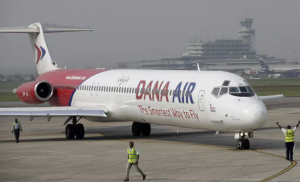Last Thursday the governor of Zamfara, one of Nigeria’s poorest states, held a ceremony to mark the start of construction on an international airport in the state capital Gusau.
“The economic benefits and multiplier effects … are quite enormous,” Dauda Lawal said. “The airport will have a tremendous impact on the ease of doing business and other social interactions [here].”
Barely a month before, Alex Otti, the governor of Abia state in the south-east, had thanked federal officials for approving an airstrip project and said he would be lobbying for an upgrade to a full airport in the near future. “A journey of a thousand miles starts with one step,” Otti said.
Airports have been springing up around the country in recent years; for the most part absent are any concerns about the environmental impact of air travel. Nigeria already has 33 airports – all but two entirely owned by the federal or state governments – as well as 13 airstrips, four military airfields and 128 sites with helipads.
Despite the proliferation in projects, the number of journeys taken by air fell last year to 15.89m, down from 16.17m in 2022. Passenger traffic is incredibly concentrated: just three airports accounted for 92% of all passenger journeys nationwide in 2022, according to the Nigeria Civil Aviation Authority.
For some observers the rush to build airports is less about economics and more about political prestige.
“The simplest answer is that [politicians] have run away from roads the way they ran away from the railways … because roads are harder to fix and need more coordination,” said Feyi Fawehinmi, an author and political commentator. “[Airports] are also shiny and building them allows politicians to say they’ve ‘connected’ their state to the rest of the country and the world.”
In some instances state governments have opened airports only to find it hard to maintain them. Last year an airport was inaugurated in Ebonyi state that cost 36bn naira (£19m). Months later, an additional 13.7bn naira was spent on repairing its barely used runway. Then, in May this year, the federal government said it was stepping in to take over the facility from the state. “We have FEC [the Nigerian cabinet] approval,” an official said. “The only thing left is for us to refund the Ebonyi state government.”
Nigeria’s aviation minister, Festus Keyamo, defended the latest projects as a “social amenity for the people”. “In a vast country like Nigeria that is also very sensitive in terms of geopolitical issues, ethnic balancing and all, you want to ensure that infrastructure is evenly distributed,” he said. “The most important thing is that airports in Nigeria go beyond commercial viability … they are not only for the pleasure of those who can afford to fly.”
“Heathrow used to be a village until the airport came,” said Samuel Akinyele Caulcrick, a former rector of the Nigerian College of Aviation Technology. “Politicians have their own reasons for building them [but] what we should be asking is why are we not using them to their full potential, because airports are supposed to drive development wherever you put them.”
Part of the problem is cost: fares have doubled in the past three years in a country where more than half the population live on less than £1 a day. Multiple taxes imposed by different government agencies don’t help, and nor do high service charges.
In 2023 the International Air Transport Association said the $100-a-passenger service charge at Lagos and Abuja airports was the most expensive globally. “How can you have such high taxes and expect to be profitable?” Kamil Al-Awadhi, Iata’s vice-president for Africa and Middle East, reportedly said at the time.
One solution put forward at industry forums to reduce the number of “ghost” airports operating far under capacity is for an expansion in freight transportation by plane. Caulcrick pointed to the possibility of flying raw and processed goods to Lagos port for exportation instead of bringing them by truck.
Toni Ukachukwu, the head of the Lagos-based consultancy Aviators Africa and host of ASAP, a podcast on industry sustainability, said the industry needed to expand beyond traditional commercial and business passenger aviation in large jets.
“In South Africa and Kenya you have your three, four and five-seater airplanes that do scenic flights, agricultural flights, game reserve flights etc,” he said. “We don’t have that in Nigeria.”
Ukachukwu suggested the industry should learn from a rare domestic success story. “Ibom Air is one model Nigerian operators need to look at,” he said, referring to the oil-rich Akwa Ibom state’s carrier, which has a reputation for punctuality. “State-owned but independently managed by professionals … for five years, they have steadily grown to where they are now.”
The Guardian

